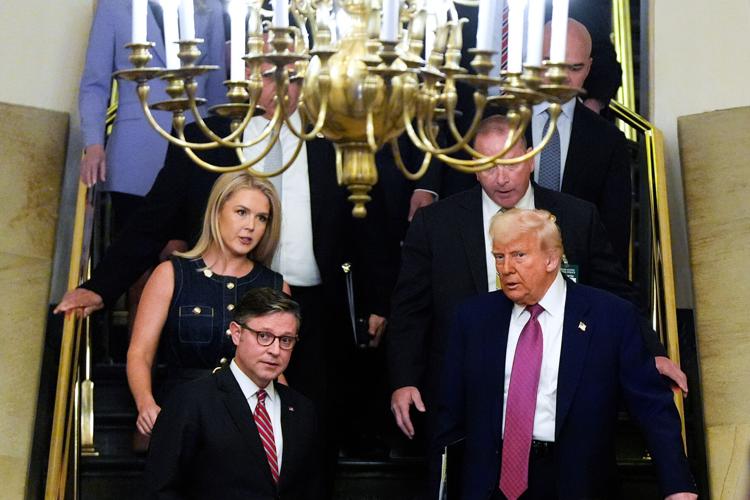WASHINGTON — President Donald Trump implored House Republicans at the Capitol on Tuesday to drop their fights over his big tax cuts bill, a multitrillion-dollar package that is at risk of collapsing before planned votes this week.
During the more than hour-long session Tuesday, Trump warned Republicans not to touch Medicaid with cuts, and he told New York lawmakers to end their fight for a bigger local tax deduction reversing his own campaign promise.
The president, heading into the meeting, praised Speaker Mike Johnson, but he also criticized at least one of the GOP holdouts as a "grandstander" and warned that anyone who doesn't support the bill would be a "fool."
Negotiations are slogging along and it's not at all clear the package, with its sweeping tax breaks and cuts to Medicaid, food stamps and green energy programs, has the support needed from the House's slim Republican majority. Lawmakers are also being asked to add some $350 billion to Trump's border security, deportation and defense agenda.
People are also reading…

Speaker of the House Mike Johnson, R-La., and President Donald Trump arrive Tuesday for a House Republican conference meeting at the U.S. Capitol in Washington.
Inside, he spoke privately in what one lawmaker called the president's "weaving" style and took questions.
The president also made it clear he's losing patience with the various holdout factions of the House Republicans, according to a senior White House official who spoke on condition of anonymity.
It was not at all clear that Trump, who was brought in to seal the deal, changed minds.
"We're still a long ways away," said Rep. Andy Harris, R-Md., the chair of the House Freedom Caucus.
Conservatives insist on quicker, steeper cuts to federal programs to offset the costs of the trillions of dollars in lost tax revenue. At the same time, a core group of lawmakers from New York and other high-tax states want bigger tax breaks for their voters back home. Worries about piling onto the nation's $36 trillion debt are stark.
With House Democrats lined up against the package as a giveaway to the wealthy at the expense of safety net programs, GOP leaders have almost no votes to spare. A key committee hearing was scheduled for the middle of the night Tuesday in hopes of a House floor vote by Wednesday afternoon.
"They literally are trying to take health care away from millions of Americans at this very moment in the dead of night," said House Democratic Leader Hakeem Jeffries of New York.
Trump has been pushing hard for Republicans to unite behind the bill, which has been uniquely shaped in his image as the president's signature domestic policy initiative in Congress.
Asked about one of the conservative Republicans, Rep. Thomas Massie of Kentucky, Trump lashed out.
"I think he is a grandstander, frankly," the president said. "I think he should be voted out of office."
Massie, a renegade who often goes it alone and wears a clock lapel pin that tallies the nation's debt load, said afterward he's still a no vote.
Also unmoved was Rep. Mike Lawler, one of the New York Republicans leading the fight for a bigger state and local tax deduction, known as SALT: "As it stands right now, I do not support the bill. Period."
The sprawling 1,116-page package carries Trump's campaign promises to extend the tax breaks approved during his first term while adding new ones, including no taxes on tips, automobile loan interest and Social Security. There's also a higher standard deduction, of $32,000 for joint filers, and a bigger child tax credit.
The Committee for a Responsible Federal Budget, a nonpartisan fiscal watchdog group, estimates that the House bill is shaping up to add about $3.3 trillion to the debt over the next decade.

President Donald Trump, center, surrounded by Speaker of the House Mike Johnson, R-La., and Rep. Lisa McClain, R-Mich., speaks to reporters Tuesday before a House Republican conference meeting at the U.S. Capitol in Washington.
Republicans criticizing the measure argued that the bill's new spending and tax cuts are front-loaded, while the measures to offset the cost are back-loaded.
In particular, the conservative Republicans are looking to speed up the new work requirements that Republicans want to enact for able-bodied participants in Medicaid. They were proposed to start Jan. 1, 2029, but GOP Majority Leader Steve Scalise said on CNBC that work requirements for some Medicaid beneficiaries would begin in early 2027.
At least 7.6 million fewer people are expected to have health insurance under the initial Medicaid changes, the nonpartisan Congressional Budget Office said last week.
Republican holdouts are also looking to more quickly halt green energy tax breaks, which were approved as part of the Biden-era Inflation Reduction Act, and are now being used for renewable energy projects across the nation.
But for every change Johnson considers to appease the hard-right conservatives, he risks losing support from more traditional and centrist Republicans. Many signed on to letters protesting deep cuts to Medicaid and the rolling back of clean energy tax credits.
If the bill passes the House this week, it would then move to the Senate, where Republicans are also considering changes.

















